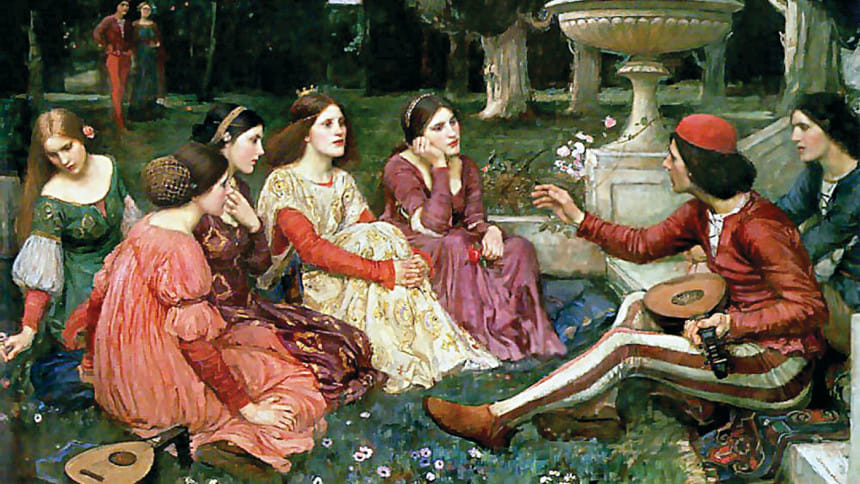The pandemic in poetry

"The virus is slowing us down to the speed of poetry." – Billy Collins
Whenever there has been an outbreak of pandemics, artists and authors have responded, with a sense of responsibility, to the miserable human condition. If hundreds of thousands of people die of a fatal disease—sometimes the figure reaching to 50 or 60 percent of the population of a city or a country—silence reigns supreme, and in this state, poets and writers attempt to break the silence, recording the intensity of misery and reality in poetry and fiction. As the history of pandemics suggests, a great number of poets and writers have composed groundbreaking works reacting to human suffering. Some notable examples are Boccaccio's The Decameron (1353), Mary Shelley's The Last Man (1826), Manzoni's The Betrothed (1827), London's The Scarlet Plague (1912), Maugham's The Painted Veil (1925), Camus's The Plague (1947), Koontz's The Eyes of Darkness (1981), Marquez's Love in the Time of Cholera (1985), Saramago's Blindness (1995), and Brooks's Year of Wonders (2001), which are all considered enduring masterpieces. People are currently perusing The Plague as if "the novel were a vaccine," as if it were "something that can help heal us." It is assumed that gloom descended upon some of Shakespeare's plays because of the troubling plague in England in 1592, which lasted until 1594. In an article titled "From Sa'di to Boccaccio: The literary legacy of pandemics," Hamid Dabashi, Professor of Comparative Literature, Columbia University, refers to Saadi's poems in which there's an account of human suffering caused by famine in 13th century Persia. Saadi's most powerful lines, as Dabashi quotes, read, "A famine of such devastation one year happened in Damascus/ That lovers forget all about love…"
Poetry plays an important part in bringing joy to the agonised and solace to the affected. As Simon Armitage, poet laureate of the UK, lays out in his arguments, "Poetry is by definition consoling; it often asks us just to focus and think and be contemplative. It asks us to be considerate of each other and the world." Armitage has written a great poem entitled "Lockdown" on the Coronavirus effect that The Guardian has recently featured. In his introduction to the poem, the poet claims that poetry as an essential art form helps us alleviate our agony during the critical times of pandemics. Armitage is optimistic that we may see a different planet, where everything will be new.
The present poet laureate of the USA, Joy Harjo, has also stressed on the positive role of poetry that, she believes, may help people overcome depression, and on the continuation of creativity in the face of epidemics. She states, "We always turn to the arts, to poetry at times like these when we are thrust into the unknowing, into places of terror or awe. People are calling on artists to help inspire and make sense during these times." It is really important and compelling for artists, for poets to "make sense" of things happening around them, of the events that are creating pressure on people's minds and making them sink into anxiety. Sometimes, the precipitousness or precariousness of tragic incidents transform the situation so drastically that people either become completely silent or begin to create anarchy. In these days of coronavirus, people are baffled, because the enemy shifts its colour now and then, kills people brutally, making corteges of dead bodies on streets and in fields, and seizes the surviving populace in panic—as was the picture in times of other pandemics, including plagues, flu, and the Black Death in Europe. It is the artists and poets who try to enliven and inspire the worried and the panicked during these times, making sense of and giving meaning to life.
Poets from various corners of the world are responding to these trying times, reflecting on the severity of events, the uncertainty of the future, and their personal experiences and feelings. Carol Ann Duffy, poet laureate of the UK from 2009-2019, has launched a project entitled "Write Where We Are Now" which is taking contributions from a constellation of poets from around the world. Under the project, a number of prominent poets from the UK and other countries are sharing their poems on the lockdown, isolation, social distancing, quarantine, and other lived experiences springing out of coronavirus. An international literary journal Reckoning, which is devoted to environmental justice, has made a call for creative work, including poetry, for its special series called "Creativity and Coronavirus". In this way many publications, including renowned international literary journals and magazines, are trying to create a "lived record" of the coronavirus pandemic.
Bangladeshi poets are doing no less. A remarkable poem by a not-so-well-known but strong voice of poetry named Minar Basunia, "God Belongs to All Creatures", has become popular on social media, receiving attention from a wide readership and a slew of comments and words of praise. Basunia writes (in my translation):
God does not belong to only humans.
He has probably accepted the appeal of dolphins—
He has probably responded to the prayers of the sea—
He has perhaps deeply listened to the pleas of the woods—
He has perhaps considered the demands of the hills reasonable.
Here the poet refers to the injustice human beings have been perpetrating against the environment for hundreds of years; other creatures in nature had probably been making an appeal to God, who belongs to everyone and everything, for a long time for their safe existence on earth, and God has listened to them now. Both eco-critically and philosophically powerful, this poem tenders an important message to human beings to be considerate of each other as well as of nature. In response to coronavirus, I've also attempted to write a few poems, from which I feel tempted to share a few lines:
Silence has gripped the whole wide world
No one weeps anywhere on earth anymore
It seems everyone is waiting for the last call
The world is blanketed in despair and silence.
Finally, I'd like to quote American poet Billy Collins, who with his keen observations seeks the progress of the world through poetry. Although the "virus is slowing us down," Collins confirms, the world will certainly retrieve a green light at "the speed of poetry." In conjunction with medical science, art in general and poetry in particular is inevitable for the world—more so in the toughest times of pandemics—because a world without poetry poses a threat to the mental health and sane survival of humanity. During these days of devastation, poetry may help us keep mentally strong, save us from falling prey to despair, and deliver us from the prospect of etiolating the self. Poetry inculcates common decency, heals wounds, assuages anxiety and dissipates despair, leading us toward a world that may emerge newer and wiser.
Dr Mohammad Shafiqul Islam is Associate Professor, Department of English, Shahjalal University of Science and Technology, Sylhet. Email: [email protected]. His poetry collection Inner State was published by Daily Star Books in February 2020. Follow Daily Star Books on Facebook and @thedailystarbooks on Instagram for updates.

 For all latest news, follow The Daily Star's Google News channel.
For all latest news, follow The Daily Star's Google News channel. 



Comments